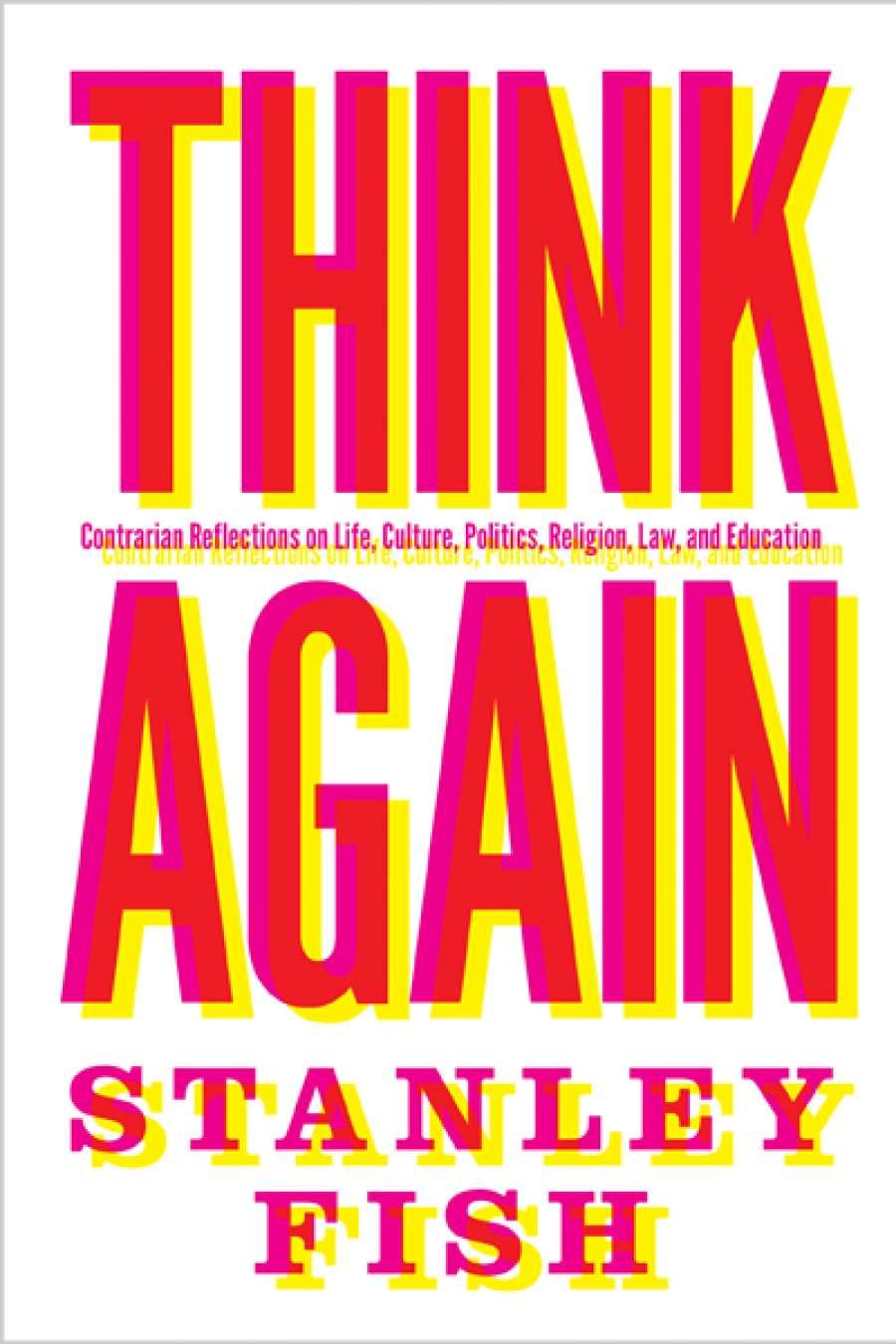
- Free Article: No
- Contents Category: Politics
- Custom Article Title: Glyn Davis reviews 'Think Again' by Stanley Fish
- Book 1 Title: Think Again
- Book 1 Subtitle: Contrarian Reflections on Life, Culture, Politics, Religion, Law, and Education
- Book 1 Biblio: Princeton University Press (Footprint), $69, 448 pp, 9780691167718
The boycott issue goes to the core of many allied concerns for Fish – the role of humanities, free speech, and the first amendment in American life, the status of religious belief in a liberal democracy. As a renowned Milton scholar and a lawyer, Fish combines an interest in literary theory with deep immersion in legal reasoning. The combination provides striking commentaries on contemporary intellectual life, with a reach that extends comfortably from postmodernist texts to Supreme Court judgments.
In this selection from 300 or so columns written for the New York Times over twenty years, Stanley Fish generally avoids expressing a view on the topics raised. Rather, Fish is a contrarian in a very specific sense: his interest is logic and argument, and his preferred approach is to examine the validity of public discourse. He takes apart findings he likes and dislikes with equal relish. Fish can agree with Justice Antonin Scalia that the American constitution does not 'evolve' like some living organism, but is a legal document to be interpreted. Yet the next chapter takes Justice Scalia to task for how he interprets – for Fish, the literary scholar, the task of interpretation is to interrogate intention rather than meaning. 'Justice Scalia is right to champion orginalism, but he backs the wrong version of it,' pronounces Fish.
Explicit opposition to a boycott of Israeli academia breaks the mould of this approach. Fish is always normative, and often explicitly moral in judgement, but his preferred approach is to hold argument to the light rather than offer opinions. He devotes a number of columns to the case for atheism advanced by Sam Harris, Richard Dawkins, and Christopher Hitchens. Fish is unconvinced by their books – 'shallow, callow, historically uninformed, and downright silly' – yet expresses no view on whether God exists. Just because he 'came down on the reasoning' of a bad argument does not mean the author has 'rejected its position or embraced the position of the other side'.
This standing above the fray apparently infuriates many readers. Fish often reports reader reactions to earlier columns, with pleas the author be more explicit about his views. Here readers respond to the typical form of the newspaper Op-Ed – a short argument in favour of some proposition – rather than the strategy preferred by Fish, to think about thinking.
 Stanley Fish
Stanley Fish
Given his previous role as Dean of Liberal Arts and Science at the University of Illinois at Chicago, Stanley Fish is particularly concerned about developments in the humanities. He favours a return to composition classes for students, and likes professors who stick to their subject and do not turn classes into exercises in 'partisan advocacy'. For Fish, the role of the academic is not to change the world but to analyse it. Academic politics, in his view, should be about academic matters – curriculum and teaching, research, departmental leadership, establishing standards. Fish does not buy the moral panic of some American conservatives about postmodernism and its influence, nor extol some subjects as more important than others. In learning to think critically, it is the method not the content that matters.
Fish has no interest in universities seeking a wider role in the world. He feels little need to justify scholarly work by utilitarian standards. Fish notes but rejects criticism in Texas about faculty members who occupy themselves 'writing academic journal articles that few people read':
That, of course, is an accurate description. Senior faculty members do in fact write articles that only their peers at the top of very rarefied disciplines can read. That is what academic research is all about: highly qualified scholars working on problems that may have no practical payoff except the unquantifiable payoff of advancing our understanding of something in philosophy or nature that has long been a mystery.
Criticism of obscure scholarship and arcane language, he observes, aims at the humanities; similar approaches in economics or engineering get a free pass, because these subjects are presumed to possess instrumental value. Yet Fish is not disturbed by such criticism. 'Of what use are the humanities?' he asks, only to answer 'none whatsoever'. We value the humanities for what they are. No extrinsic justification is required. The humanities should not be justified by calculable effects. They have no end, but are their own achievement.
Think Again is a memorable achievement, offering a standard of argument rarely published in media. Fish dispenses quickly with autobiographical chapters so he can turn to ideas. He gives the reader, in turn, much to contest. Fish is an erudite contrarian. By his own account the politics in the book are anti-liberal because liberalism privileges impartiality while Fish finds double standards right and good, and prefers local to universal values. He is well versed in philosophy but finds it of little consequence. Fish rejects art that pursues a political agenda. He challenges the traditional standpoint of an objective observer along with claims to a baseline rationality. He attacks Orwell's 'Politics and the English Language' (1964) as a 'really terrible essay', and remains unconvinced by defences of the humanities as a practice that will enhance citizenship or save democracy.
Above all, Stanley Fish embraces the idea of an ivory tower, with scholarship that embraces a 'purity of motive' based on contemplative analysis. This is a thinker who likes enclosures, boundaries, and internal spaces. Like those annoyed readers quoted in the book, there is much more to say on these important topics – but few interlocutors who can write so well or argue so coherently.


Comments powered by CComment